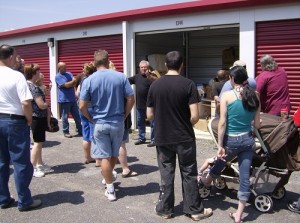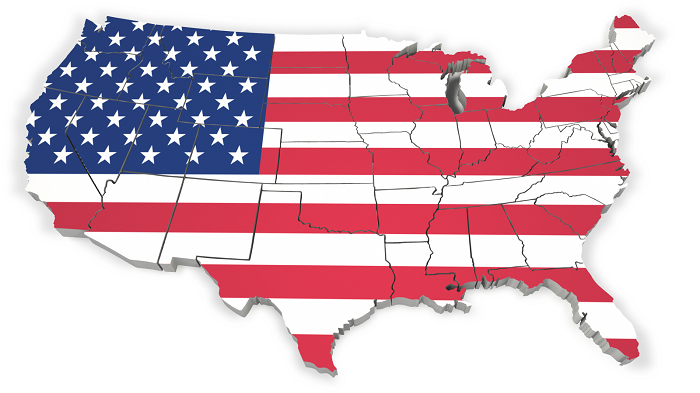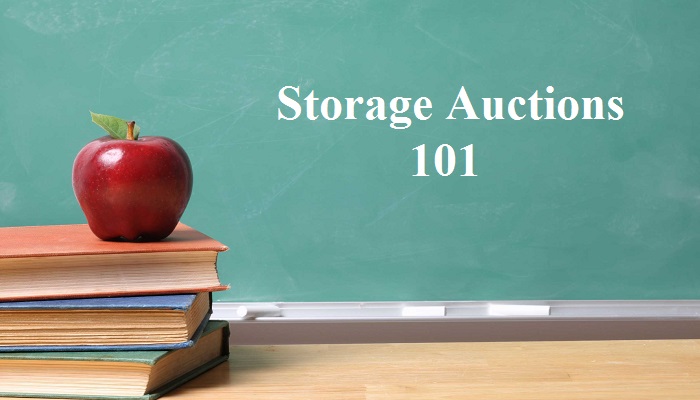In the following article, we will elaborate on the rules that are common at most storage unit auctions throughout the United States. Storage auction rules and laws vary by state, storage facility and auctioneer, so please consult with a professional in your area before relying on the following information. The official rules will usually be given out prior to each auction. It is the buyer's obligation to familiarize themselves with federal, state and local laws relating to the purchase, transportation and possession of their merchandise.
Bidder registration. Please arrive at the storage facility 10-15 minutes early to allow yourself enough time to register and get familiar with the rules. Once you arrive, go into the rental office and sign in. Each person who wants bid must register and obtain a bidder number from the storage facility or auctioneer before the auction begins. If you fail to register and you win a unit, the auctioneer or storage facility reserves the right to sell the unit to the next highest bidder. Your bidder number will usually be next to your name on the sign in sheet. If you buy a storage unit, you will need this number, so it is a good idea to remember it. Some storage facilities and auctioneers will have you sign an acknowledgment of the rules, while others will announce the rules verbally. The terms and conditions may vary from one auction location to the next.
There is no fee to register for an auction. When you register, you will be asked to provide your name, address, phone number and your tax exempt status. At some auctions, you will be asked for valid identification, although this is rare. Rest assured, the storage facility is not allowed to give out your personal information, so you don't have to worry about the former owner contacting you to get their stuff back.
Some auctioneers and storage facilities will have several auctions occurring on the same day. Some auctioneers and storage facilities will require you to sign in at every location, while others only require you to sign in once for the entire day. Please speak with your auctioneer or storage facility manager to confirm their policy.
Storage facility owners, managers and employees are eligible to participate in the bidding process, although most do not, in fear of a conflict of interest.
Payment. If you win a storage unit, you must report to the rental office at the conclusion of the sale. Full payment must be made before you can remove any merchandise from the storage unit. You will be required to pay the bid amount, sales tax (unless exempt) and the security deposit at that location before moving on to the next facility. Cash is the primary method of payment at storage auctions, although some storage facilities do accept debit and credit cards. Checks are almost never accepted. Please speak with the storage facility manager about the accepted methods of payment prior to placing a bid.
Once you arrive in the rental office, the auctioneer or storage facility manager will be processing the payments of the winning bidders. Usually, only one transaction is processed at a time, so there may be a line. If you are tax exempt and the auctioneer or storage facility doesn't already have your resale tax number on file, please have your resale certificate ready for them so that they can make a copy. Once they accept your payment, you will be issued a receipt and a temporary access code to the storage facility.
Please make sure you have enough cash on your person to cover your bid. The auctioneer doesn't have time to wait for you to go to the bank or ATM because they must move on to the next location. If you decide to go to an ATM after the auction, you do so at your own risk. If you you're not back before the auctioneer or storage facility manager has finished processing the other winning bidders, they reserve the right to terminate your bid and resell your unit to the next highest bidder.
Sales tax. Sales tax must be paid unless no tax is due. If you have a lawful exemption, a valid resale tax number on file with the comptroller's office or if you are purchasing a vehicle, trailer, recreational vehicle or boat, sales tax will not be charged. If you are tax exempt, the auctioneer or storage facility will have you fill out a tax exempt form which is then kept on file. All other buyers must pay sales tax on the amount of each winning bid.
Announcements. Any announcement made the day of the sale, prior to or during the auction, will supersede any other announcement or advertising. The auctioneer or storage facility manager reserves the right to reject any bid, place a minimum bid, revoke bidding privileges or cancel the sale completely. They may also sell the units in their entirety, in lots or item by item.
Age minimum. Buyers must be over the age of 18 to bid. Some storage facilities do not allow children, so it is a good idea to call the storage facility in advance if you need to bring them with you. When children are permitted, they must be supervised at all times.
Inspection. During inspection process, the auctioneer or storage facility manager will remove the lock and raise or open the door. Everyone will have an equal opportunity to inspect the contents of the unit from the doorway. Please do not go inside the unit or touch any items. If you are seen doing so, the auctioneer or storage facility manager reserves the right to refuse your bid and/or ask you to leave the auction. Once everyone has had a fair amount of time to inspect the unit, the auctioneer or storage facility manager will open up the bidding.
All items are sold “as is.” Please examine the storage unit thoroughly before placing a bid, because once the auctioneer or storage facility manager says sold, you have bought the unit. All storage units are sold “as is” and without warranties, representations or guarantees. All sales are final.
Securing the unit. If you win the unit, you must immediately place your own lock on it. If you do not have a lock, you can usually purchase one in the rental office. The storage facility is not responsible for the contents of the unit after it has been sold.
Cleaning out the unit. Most storage facilities allow you 24-48 hours to remove all of the contents and sweep the unit clean. Every now and then, you will come across an auction that requires the winning bidder to remove the contents on the same day, although this is rare. The auctioneer or storage facility manager will announce how much time you have before the auction begins. If you need additional time, most storage facility managers are willing to work with you as long as you keep them informed. You also have the option of renting the unit, which allows you to take your time.
If you fail to clean out a unit, it can have severe consequences like losing your security deposit or being banned from future auctions at that storage facility. If the auctioneer hears that you failed to clean out a unit, you could be banned from all of his or her future auctions.
The storage facility's dumpster may not be used by buyers without the permission of the facility manager.
Cleaning deposit. Most storage facilities require you to pay a cleaning deposit on every unit you purchase. These deposits usually range from $40-100 and are fully refundable if the unit is cleaned properly within the designated time. The purpose of the cleaning deposit is to prevent people from purchasing a unit, removing all of the valuables and leaving the unwanted items and trash behind.
Once you are finished cleaning out the unit, please stop by the rental office and let the employee on duty know. The employee will inspect the unit to verify that all of the contents have been removed and that it has been swept out. If the unit has been cleaned out properly, the employee will return your security deposit.
Personal items. If you find personal items inside of the unit, please leave them with the property manager so they can return them to the tenant. Personal items include photographs, identification, tax and legal documents, birth, death and marriage certificates, diplomas and items with sentimental value.
Common courtesy. Please be civil toward the auctioneer, storage facility employees and other bidders. Anyone that is disruptive or causes an altercation will be asked to leave and could be barred from attending future auctions.
 Occasionally, the bids on a storage unit at auction can go very high. The unit might be filled with rare items and collectibles, or the bidders may just be eager to win the unit in hopes of turning a profit on its contents. In some cases, the price of a unit can be dramatically inflated by overenthusiastic bidders, and the auctioneer might find himself bringing in a substantial sum of money for the items being sold.
Occasionally, the bids on a storage unit at auction can go very high. The unit might be filled with rare items and collectibles, or the bidders may just be eager to win the unit in hopes of turning a profit on its contents. In some cases, the price of a unit can be dramatically inflated by overenthusiastic bidders, and the auctioneer might find himself bringing in a substantial sum of money for the items being sold.










